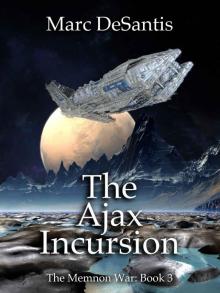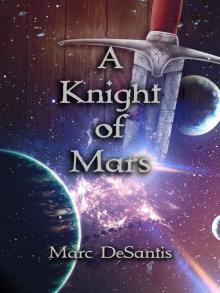- Home
- Marc DeSantis
A Knight of Mars Page 2
A Knight of Mars Read online
Page 2
The knight took a sip from his wineskin and then placed it beside him. Across his knees he laid his musketoon. He did not appear to be at all nervous, merely expectant.
“I noticed that your armor, your breastplate, I mean, has a deep dent in it. Did an enemy musketeer come close to ending your life,” I asked.
Sir Rodney chuckled. “Not at all. Such is the practice of all Tithonian armorers, and others as well, mind you, to prove the quality of their steel. That dent was made by the craftsman himself, who fired a ball at the breastplate to show that it could resist such an impact without piercing or shattering. It is called a proofmark.”
I laughed at my own ignorance. “I had thought that there was a story behind it, a tale of battle on some far-off field.”
“Would that it was the closest call that I had ever had in battle, dear boy,” Sir Rodney said, his eyes flicking back every now and again out the window. “Lady Fortune is fickle. I have come close to death on many occasions, but never so near as when, marching back to camp, my horse was startled by a small animal of some kind, I still do not know what it was, and I was thrown from the saddle. I am lucky that only my arm was broken.”
“It must be a hard thing, to fight as a profession,” I said. “Others run from danger, but you must run towards it, and confront it.”
Sir Rodney thought for a moment. “That is one way to look at it,” he said. “But I had been brought up by my father to be a knight, as he was by his father, and so on, stretching back many generations. It is what I know.”
“You have been to many places on Mars,” I said.
Sir Rodney nodded. “I have been around the world several times, though most of my service has been with either the greater or lesser lords of the Valley. This is the most developed portion of Mars, and also the most warlike, in many ways.”
“That is odd, I should think.”
“Not so,” Sir Rodney replied. “There are many organized states here, with standing armies, and also many local lords who value their independence from the larger polities. Trade routes criss-cross the region. There is always something to fight over.”
“I suppose that you could have stayed on your own lands, once your king had pacified his kingdom, and enjoyed its fruits. Why have you sought out wars in foreign lands? How my father and I wish that Ophir could have a generation of peace! There is always some petty warlord who wishes to encroach upon another’s fields, or a vassal to some duke who wishes to be a vassal no longer, and then the glory-hungry knights of Ophir thunder across our vineyards, overturning our careful work.”
Sir Rodney smiled in the dim candlelight. “I have heard such complaints many times from the common folk who are swept up in the wars of Martian knighthood.”
“Do you think them overblown?”
“Not in the slightest. In fact, I agree with them. Were my place to be exchanged with that of a farmer whose wheatfields had been trampled, I would curse the knights most vociferously. In Tithonium, I will have you know, we take care to leave the common folk out of our wars.”
“It sounds like a commendable place, your country.”
“We are more attuned to the moods of the world, and live more in harmony with it, I think,” Sir Rodney said. “In the East, you are more sophisticated, but more apt to indulge in needless bloodshed in your battles. In the west, in Tithonium especially, tradition governs such things more tightly.”
“It seems strange that it should be so,” I said.
Sir Rodney shrugged, his eyes going once again to the window. “Your incomprehension is understandable. In Tithonium, many conflicts are settled swiftly by personal combats between champions. Here, you will use single combat only as a prelude to the larger battle, and then fight that out to the bitter end. What purpose then did the individual combat serve? None. I have seen such awful waste,” Sir Rodney said, wincing. “It is also why there is such a demand here for a man with a good sword arm,” he said, shaking his right limb in the air. “Your wars are bloody, and long.”
“I wonder, at times, if I should seek out a life of adventure,” I said. “Ophir is a beautiful country, and I love my grapes, but there are days when I ask if this will be my lot for the rest of my years. Should I not seek to experience life to the fullest? I tell you, sir, that I accompanied my father mainly to escape for a while from the confines of our little valley. My father is content to remain within his small world of wine and vine, but I know there must be something more out there for me.”
Sir Rodney nodded slowly, his eyes peering briefly out the window. “I know those words, Claude. I have heard them before.”
“You have?”
“Very much. I spoke them myself, when I was your age, at least words to similar effect. You are more eloquent than I am, and a deeper thinker too. I will tell you though, that your desires are no different from any number of young men in the world. My friends and I, when we departed Tithonium, were all of the same opinion. Our home country was too small for us, we thought, we would go abroad as Free Lances and seek our fortunes across the face of the planet. So we did.”
“And what became of your friends?”
Of the six youths that once comprised our adventurous group, I alone remain. Sir Richard was lost at the Noctis Labyrinth. I saw him fall. Sir Thomas perished at the Siege of Schiaparelli. Sir Quentin the Tall died of pneumonia contracted after the Battle of Sagan. Sir William was slain by a Xanthean arrow on the caravan route to Syrtis Major. And Sir Charles died fighting pirates on the Boreal Ocean. I am all that is left of our merry band.” There was no merriment in Sir Rodney’s voice.
“I am sorry.”
Sir Rodney shook his head slowly. “Don’t be. Such is the way of war. We all knew what awaited us, what the risks of our profession were. Knights are raised for war, that is a point that is often overlooked by others. We are not mere soldiers who fight because coin is placed in our hands, as if being a knight was like being a chimney-sweep, or some other such common job, although we accept money in exchange for our services. No, we are men of war. It is our life.”
“You think then that I am naive to wish to go abroad?”
“Only a little. You have to realize that Mars is not a place for the faint of heart. I have been able to find employment across the face of this planet because of my sword and musketoon,” Sir Rodney said, tapping the polished wooden stock of his firearm. “My skills are in high demand. What would you trade for coin? Your knowledge of winemaking? The finest of all vineyards lie in your own country. You might as well remain there. You could instead become a merchant, I suppose, and have to worry about the depredations of greedy customs officials at city gates, and the bandits who harry the roads. No, I do not seek to patronize you, but you seem to have a life that would be the envy of nearly everyone else on Mars, myself included.”
I sat chagrined for several moments. My boyish daydreams had been placed into sharp perspective by Sir Rodney who . . .
. . . leaped from his chair. In one fluid motion he raised his musketoon to his shoulder and thrust the short barrel out of the window. He fired, and the room echoed resoundingly with the earsplitting blast. A cloud of acrid smoke filled the small chamber. Another blast followed from below. Sir Rodney smiled in satisfaction. “That was Squire Edward.”
We rushed out of the room and down the spiraling stairs. My father poked his head out but Sir Rodney shouted for everyone to remain within. We ran out of the tower door. Two Xantheans lay unmoving, near to my horse. Edward kicked both of them. They did not move or make any sound. “Dead and dead,” he said to Sir Rodney.
“Good work, boy,” Sir Rodney said, clapping Edward on the back.
“Thank you, sir.”
Sir Rodney gazed with scorn-filled eyes at the Xantheans. “That was for Sir William,” he spat. “I had hoped to get all three. They may have friends.”
Sir Rodney's clever plan became instantly apparent to me. “You used my horse as bait to lure the Xantheans close, so that you could get a good
shot at them!” I reproached.
Sir Rodney’s smirked and his eyes narrowed. “You didn’t expect me to risk my own steed, did you now?”
The next morning, after breakfast, we departed from the waterwheel, and again followed the road south. Sir Rodney led the way, his eyes returning now and again to the east.
“You fear something,” my father asked him.
“Only that the third horseman returns with others,” the knight said. "He will want revenge." Then his expression eased. “Come now, Jacques. Continue with your tale of ancient times on Mars. When you stopped the night before, the Six had arrived on Mars. What came next?”
My father took up his tale once more. “Mars, I must tell you again, was in that time completely uninhabitable by humans. Though men had once walked this world, back in the Golden Time, in the era of the Six, there was no air to breathe, and there was no liquid water. Mars was so cold that a man would freeze without the protection of bulky suits meant to retain a semblance of the warmth and air pressure that we take for granted today.”
“I have heard of such things,” Sir Rodney said. “It all sounded so fanciful.”
“Nevertheless,” my father insisted, “it is true. I have myself seen pictures of the Six as they explored the surface of this world. Believe this, good people. This world was once as red as rust, for as far as the eye could see.”
“The Red Planet,” Sir Rodney said. “Mars was once named the Red Planet - by the men of Earth.”
“It was indeed, good sir. That was a long time ago.”
“I see only green and blue and brown on this world now,” Timothy said. “Did the Six change it somehow?”
“Not quite. The Six reported back to their homeworld what they had found. But Mars would need much amending if men were to live here in comfort as they do today. The atmosphere was wispy and cold. No plants could grow here. The men who came to this planet had to live within great settlements protected by glass domes to contain air for them. So the people of Earth embarked upon a generations-long effort to transform Mars into a world fit for humanity.”
“How long?” Gwendolyn asked.
“For a thousand years and a day,” my father answered.
Sir Rodney turned a skeptic's eye to my father. “Poetic license?”
“Yes” my father said with a sheepish grin. “First, the Earthmen set about protecting Mars from the ferocious solar radiation that sterilized the surface of this world. They saw that the magnetic field of Mars had stopped. They restarted it.”
“A magnetic field? Like that of a magnetic needle in a compass?”
“Like that yes, but one that enveloped the entire planet,” my father said, spreading his arms expansively around him. “Earth had one, and though much closer to the sun, it was thereby protected from its fierce rays, even while more distant Mars was not.”
“That must have taken some doing,” Sir Rodney remarked.
“It did,” my father said. “The humans of Earth were most skillful, and wielded enormous powers that are beyond us today, and likely beyond their descendants now, with whom we have no more contact.”
“So Mars was shielded by this magnetic field? Then where did the air and water come from, if it was not already here?”
“Over the course of centuries, the kingdoms of Earth, and later the Great Confederation, installed many lamps in the sky, mirrors really, to redirect the rays of the sun to warm our world. They also distributed enormous quantities of graphite powder in the icy polar regions to absorb these rays more effectively. This powder was like coal dust, so black it was. The water locked in the polar ice caps eventually melted, and as the world warmed, the ice below the surface also melted.”
“There was that much ice on Mars?”
“There was quite a lot, or so my books say. But the Earthmen added to it. They traveled to the furthest reaches of the Solar System, where large chunks of ice circle forever in the depths of space, and sent millions of them to Mars. Each one added its water to the swelling of Mars’ oceans. In time - and this took a very, very long time, mind you - Mars had enough liquid water to fill even Mariners River, Lake Ophir, Lake Candor, and Lake Tithonium. Mariners Valley had been an empty canyon before then.”
“That is startling news, to say the least,” said Sir Rodney. “It is of such a great depth, some say that it is bottomless. I was aware that we were the descendants of Earthmen from long ago, but I did not expect that my beloved Mars had been so hostile in ages past.”
“It is a hard thing to fathom, now that we see the lovely world that Mars became due to the ministrations of those bygone pioneers. Once, millennia ago, Mars was the scene of gigantic dust storms that encompassed half the world.” My father smiled. “Thankfully, those are no more.”
“So the Earthmen restarted Mars’ own heart, as it were, its protective magnetic field back in effect, and it is said that they even restored a measure of volcanism to the planet,” my father continued. “Mars was a dead world when the Six came those thousands of years ago. It came alive again.”
“I have seen active volcanoes, in the far west, near Mount Olympus,” added Sir Rodney.
“They are the legacy of the Six, and those who came after them,” my father said. “It was imperative that they warm Mars from its frozen state into one where liquid water might flow. Without liquid water, life as we know it would be impossible. In order to facilitate this warming, which took centuries, please remember, the Earthmen introduced something called carbon dioxide in large quantities. This is what we breathe out when we exhale,” my father explained. “It was called by the Ancients a ‘greenhouse gas,’ one which traps sunlight on Mars, and thereby increases its atmospheric heat, just as today we raise plants in a protected glass enclosure during the cold winter months.”
“So now that liquid water flowed on Mars once again, where did everything else come from?” asked Gwendolyn. “I mean, the plants, the trees, the horses, the birds, even the insects, if Mars was lifeless then where did they come from?”
“It is written, dear Gwendolyn, that the Earthmen brought plants and animals of all kinds from their world, once conditions were benign enough to accept them. The first step that they took, once Mars had warmed sufficiently, was to introduce small plants from Earth, algae mainly, into the new seas and oceans of Mars, which absorbed the rays of the Sun, and thrived and multiplied. They fed on carbon dioxide in the atmosphere, and in turn produced the oxygen which we now breathe.”
“So the plants made it possible for animals to live here?” Sir Rodney questioned.
“Precisely, good sir,” my father said. “All these efforts created what is called a virtuous cycle, in which an improvement or gain in one area enhances and encourages those in others, which in their turn reinforce yet others, and so on, each encouraging further improvements.”
“Other small microbes were introduced to help make the land fertile again. This rich black soil that we see here beside the river, this is the product of careful soil science. Many other species were brought from Earth. They filled the seas and lakes and rivers with fish, and the skies with birds. It has been said that some animals that we find today on Mars even came from worlds that circle other stars, but I can’t be certain if that is truth or fable.”
“After centuries had passed, the scientists declared that Mars was fit for human habitation without the need for cumbersome protective suits. Mars was now a world of blue and green, and eminently suited for agriculture. Mars was no longer called the ‘Red Planet’ by anyone. That was when the resettlement of Mars by humanity began in earnest. People did not have to cower within small cities of domed glass or tramp about in bulky and uncomfortable pressure suits. By the millions they came, fleeing the crowded Earth, looking for a new life here on this world.
“Many cities were built, as were spaceports, and long roads were laid that crossed the wilderness, like the one upon which we now travel. Within just a century of the opening of Mars to colonization, it had a population of o
ne hundred million.”
Sir Rodney whistled, impressed by the figure. “That is far more than all of the people on this world now, I should think. All of Mars today can’t have more than forty million.”
“Sadly, you are correct, good sir. It is said that as the centuries wore on, Mars became home to some ten billion souls. That was when Mars was at its height. A second Golden Time had followed the colonization. Mars became a full partner with Earth and the other planets in the Solar System,” my father said. “The skies were filled with flying machines, and the seas were plied by ships that needed no sails to move over the waves. Disease was a thing of the past, and hunger was no more.”
“Things have certainly regressed since then,” Sir Rodney said with deep weariness. “During my travels I have come upon the remains of the Elder Days, finding tools and trinkets here and there. Most will not function, certainly not in the way they were intended. I can’t even fathom the purpose of many of the things that I have found. Once I discovered a thin sheet of dark gray metal. It is called titanium. I think it was the roof of a house, maybe, or the side of a wheeled vehicle of some kind. It can’t be made anymore, not even in the smallest quantities. But there it was, a huge, flat sheet of it. I blunted a good axe chopping a piece of it off, and when ground into shape by a blacksmith, it became my shield here,” Sir Rodney said, nodding to the kite-shaped object hanging at his side. “It is so light and strong. It has never been penetrated by either sword or musket ball. It is a treasure. And in olden times, it was a roof, or perhaps a part of a wagon.”

 The Ajax Incursion
The Ajax Incursion The Memnon Incident: Part 2 of 4 (A Serial Novel)
The Memnon Incident: Part 2 of 4 (A Serial Novel) The Memnon Incident: Part 4 of 4 (A Serial Novel)
The Memnon Incident: Part 4 of 4 (A Serial Novel) The Memnon Incident: Part 1 of 4 (A Serial Novel)
The Memnon Incident: Part 1 of 4 (A Serial Novel) A Knight of Mars
A Knight of Mars The Memnon Incident: Part 3 of 4 (A Serial Novel)
The Memnon Incident: Part 3 of 4 (A Serial Novel)